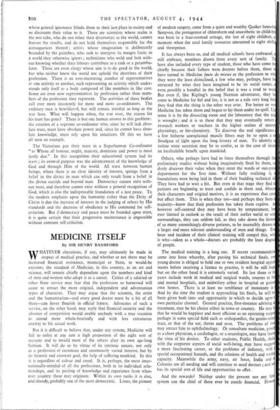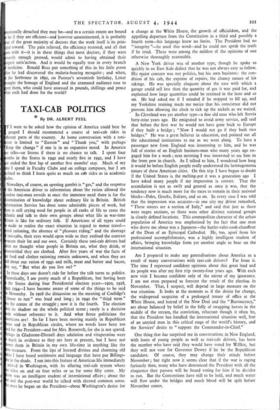MEDICINE ITSELF
By SIR HENRY BASHFORD
WHATEVER alterations, if any, may ultimately be made in respect of medical practice, and whether or not there may be increased financial assistance, municipal or State, to would-be entrants, the standard of Medicine, in this country, as an art and science, will remain chiefly dependent upon the numbers and kind of men and women who adopt it as a career. Critics of a salaried or other State service may fear that the profession so harnessed will cease to attract the more original, independent and adventurous types of character. They may argue that the scientist, the artist and the humanitarian—and every good doctor must be a bit of all three—can never flourish in official fetters. Advocates of such a service, on the other hand, may reply that financial security and the absence of competition would enable anybody with a true vocation to attend more whole-heartedly and with less extraneous anxiety to his actual work.
But it is difficult to believe that, under any system, Medicine will fail to enlist at any rate a high proportion of the right sort of recruits and to mould most of the others after its own age-long fashion. It will do so by virtue of its intrinsic nature, not only as a profession of enormous and enormously varied interest, but by its historic and constant goal, the help of suffering mankind. In this it is regardless of colour and creed. It is, perhaps, the most inter- nationally-minded of. all the professions, both in its individual rela- tionships, and its pooling of knowledge and experience from what- ever country these may originate. Within its own ranks it is also, and already, probably one of the most democratic. Lister, the pioneer
of modern surgery, came from a quiet and wealthy Quaker househ Simpson, the protagonist of chloroform and anaesthetic in child-b was born in a four-roomed cottage, the last of eight children, at moment when the total family resources amounted to eight shill and threepence.
It has always been so, and all medical schools have embraced, still embrace, members drawn from every sort, of family. have also included every type of student, those who have come chiefly because their fathers were doctors before them, those have turned to Medicine faute de mieux as the profession to w they were the least disinclined, a few who may, perhaps, have b attracted by what they have imagined to be its social status, even possibly a handful in the belief that it was a road to weal But even if, like Kipling's young Norman adventurer, they come to Medicine for fief and fee, it is not as a rule very long be they find that the thing is the other way over. For better or wo Medicine has taken them and begun to lay them under its spell. U some it is by the dissecting room and the laboratory that the is wrought ; and it is to these that they may eventually return research workers or teachers in the higher realms of anat physiology, or bio-chemistry. To discover the real significance a few hitherto unexplained muscle fibres may be to open a floodgate of light upon the long history of man. To identity isolate some secretion may be to confer, as in the case of ins an incalculable benefit upon mankind.
Others, who perhaps have had to force themselves through th preliminary studies without being imaginatively fired by them, s denly discover their value when they enter the wards or out-pan departments for the first time. Without fully realizing it, foundations were being laid in them of their budding technical They have had to wait a bit. But even at that stage they find patients are beginnihg to trust and confide in them and, What their characters and original motives, it is an experience that c but affect them. This is when they too—and perhaps they form majority—know that their profession has taken them captive. however self-centred they may have been by temperament, h ever limited in outlook as the result of their earlier social or se surroundings, they can seldom fail, as they take down the histo of so many astonishingly diverse patients, to be insensibly drawn a larger and more tolerant understanding of men and things. Es hour and incident of their clinical training will compel this, w is why—taken as a whole—doctors are probably the least d of people.
The medical training is a long one. If recent recommendat come into force whereby, after passing his technical finals, ev young doctor is obliged to hold one or two resident hospital appal ments before receiving a licence to practise, it will be still Ion but on the other hand it is extremely varied. Its last three or years include work ifl medical and surgical wards, courses at and mental hospitals, and midwifery either in hospital or pati own homes. There is at least no semblance of monotony in And by the time the student is approaching his finals, he will been given both time and opportunity in which to decide upon own particular channel. General practide, first-instance advising treatment, may be his choice either in town or country. He may that he would be happiest and most efficient as an operating surg perhaps in some special field such as orthopaedics, the genito-ur tract, or that of the ear, throat and nose. The problems of vi may attract him to ophthalmology. Or consultant medicine, poss as a chest physician, a cardiologist, or a neurologist, may have bec the vista of his desires. To other students, Public Health, de• with the corporate aspects of social well-being, may have sugg a more fascinating career, or the problems of industry, with special occupational hazards, and the relations of health and wOr capacity. Meanwhile the army, navy, air force, India and Colonies are all needing and will continue to need doctors ; and has its special sort of life and opportunities to offer.
And the rewards? Neither under the present nor any fu system can the chief of these ever be purely financial. How
otionally detached they may be—and to a certain extent are bottnd be if they are efficient—and however unsentimental, it is probably ue of the great majority of doctors that the work itself is its prin- pal reward. The pain relieved, the efficiency restored, and all that oes with it—it is in these things that most doctors, if they were verely enough pressed, would admit to having obtained their epest satisfaction. And it would be equally true in every branch medicine. Ronald Ross put something of this in his little poem ter he had discovered the malaria-bearing mosquito ; and when, the Sorbonne in 1892, on Pasteur's seventieth birthday, Lister ronght the homage of England and the crammed audience rose to eet them, who could have assessed in pounds, shillings and pence hat each had done for the world?



























 Previous page
Previous page